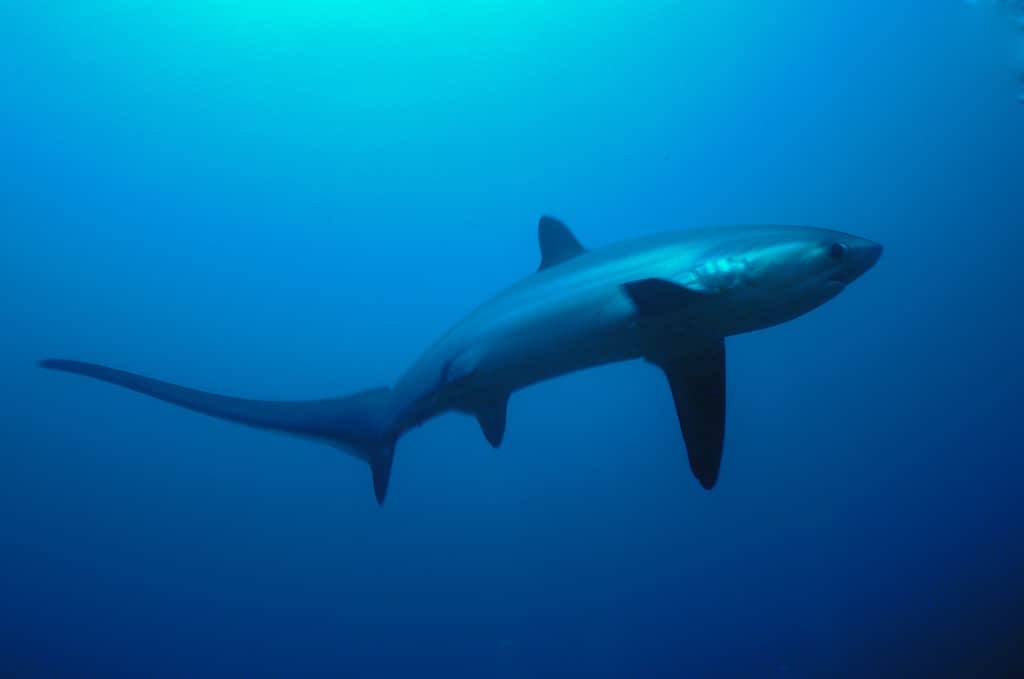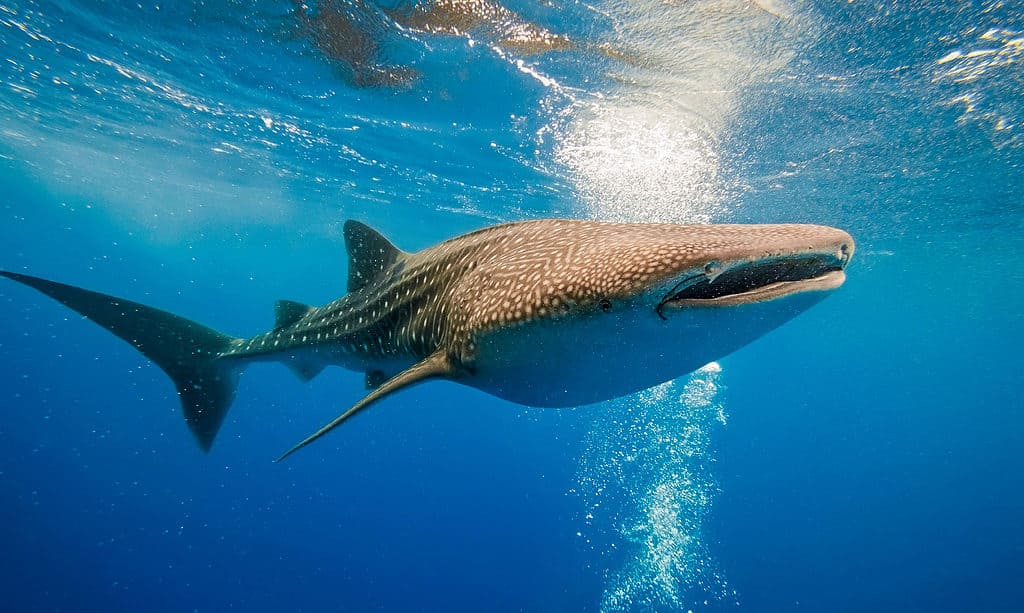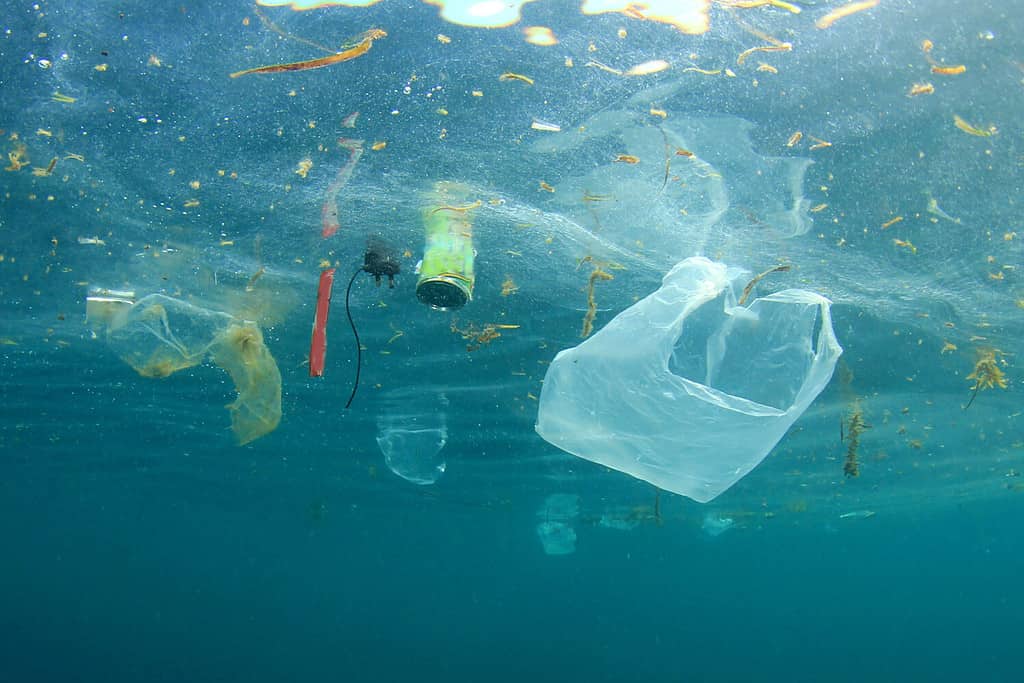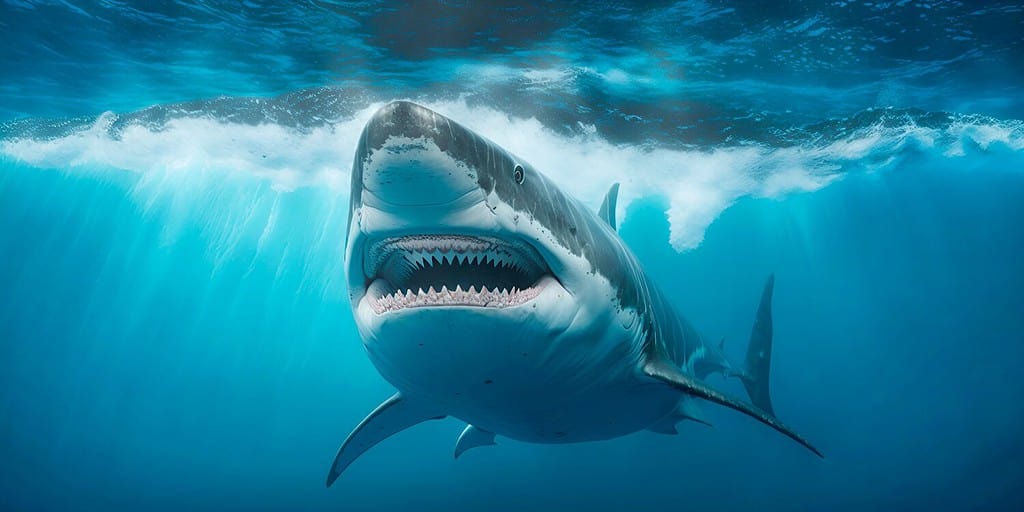How Smart Are Sharks? Everything We Know About Their Intelligence - A-Z Animals
Many people associate sharks with their massive size and deadly jaws. When someone says shark, most people imagine terrifying mouths full of row upon row of teeth. Or, people picture the dorsal fin as it appears above the water. However, many people don’t think about the shark’s brain. Is this creature truly a mindless man-eating machine, or is there a deeper intellectual capability there? In this article, we will discover just how smart sharks are as we uncover everything there is to know about shark’s intelligence.
How Smart Are Sharks?

Experts have found that sharks are capable of complex behaviors, such as recognizing familiar sharks.
©aspas/iStock / Getty Images Plus via Getty Images
While the question itself leaves some room for personal debate, there have been findings that support that sharks are not just the mindless killers people believe them to be. Experts have found that sharks are capable of complex behaviors. These behaviors include recognizing other sharks and learning to adapt to multiple environments. After all, an animal that survives multiple mass extinctions must have some form of intelligence.
Additionally, sharks are complex hunters, capable of long-distance migrations, and exhibit social learning patterns. When handed a brain, Dr. Kara E. Yopak, a shark brain expert, can confidently assume where the shark lives, how it hunts, and many other features about that shark and its life. This shows that the shark’s brain is a complex system. Additionally, it shows that each shark has an intellect that helps it adapt and survive to its specific environment.
Shark Brains: All You Need to Know About Shark Intelligence
A common misconception about sharks is that they have tiny brains. Contrary to popular belief, experts have proven that sharks do not have unusually small brains. Scientists compare shark brains to mammal brains in regard to the relation between brain size and body size. Dr. Kara explains that the shark brain is similar to that of humans in that you can separate it into different components. Additionally, each component of the brain has a different function.
One example of these components is that sharks have an entire section of their brain dedicated to their smell and processing odors. Another section of their brain is also dedicated to movement and motor control. Experts claim that shark brains are the blueprint for all vertebrae brains.
Shark Brains and Shark Smarts Across Species

While there is some debate on how smart sharks are, experts have found that there are differences in brain organization in different species of shark.
©Krzysztof Odziomek/Shutterstock.com
All sharks have the same regions of their brain and the same components. However, Dr Kara clarifies that “they have huge differences in brain organization, in the relative size and complexity of those components.” Dr. Kara found that sharks with similar lifestyles and habitats often have similar brain patterns. One example that she found was with deep sea sharks.
All of those sharks’ brains were similar in their small size and were broken up similarly. For example, they had a large region for processing scent and a small region for processing vision. This differs from sharks that live in regions with a lot of light. For example, when she studied the brains of reef sharks, she found that their composition was almost opposite to that of the deep sea sharks. The shark’s habitat and lifestyle directly affect its brain size and function. Each shark’s brain is specifically designed to help it survive in its environment.
Shark Brains: Does Size Affect Intelligence?
While shark brains are not as small as many would assume, some species have smaller brains than expected. In fact, it tends to be the larger of the sharks with smaller brain sizes. One example of such correlation is the whale shark. While whale sharks are massive creatures weighing between 15 and 20 tons, their brains are smaller than their mass. Does the size of the brain matter? Is it safe to assume that an animal lacks or has intelligence based solely on their brain size? The answer is a complex one. While the size of the brain was smaller, Dr. Kara found that the complexity of the whale shark’s brain was very high. She noted that they had an extremely large cerebellum and that the brain was highly folded.
Based on her findings, she noticed a correlation between sharks’ size and their cerebellum complexity. This led her to conclude that larger sharks have this more developed section of their brain to assist them with moving their large bodies. So, while size plays a role, it would appear that the complexity of certain brain areas also plays a large role in a shark’s intelligence and abilities.
Shark Brain vs. Human Brain
While people may say that sharks are less intelligent than humans because they cannot solve complex math problems or have introspective conversations, shark brains have their own complexities and unique features. Dr. Kara points out that “Shark brains have a lot of plasticity,” and they can even do something human brains cannot. Sharks can “constantly regenerate neurons through their entire life,” whereas humans are born with mostly all the neurons we will ever have in life. Another difference between our brains and sharks is the shape. Unlike human brains, shark brains have a different shape. Shark brains resemble a spark plug and are long and thin in shape.
Additionally, the human brain and the shark brain have different capabilities. For example, the human brain has the capability to contemplate itself. That is a unique trait of the human brain. However, experts found that sharks’ brains are also tailored to fit their needs. This can be demonstrated in the difference between brain sizes and organization between species. Many people argue that sharks are smart animals, given all that their brains allow them to do.
How Humans Affect Shark Brains?

Pollution and toxins in the ocean have been linked to a multitude of health issues for various marine life.
©Rich Carey/Shutterstock.com
Each shark species has a different makeup and complexity level to their brain. With this variability comes variability in how each shark perceives and interacts with its environment. Knowing this can help humans change how they interact with certain shark species. Each species responds differently to sensory signals. Many people hope, with growing research in this field, that there could be the possibility of some shark deterrent in the future. However, Dr. Kara discusses how there would not be a one-size-fits-all option for a shark repellent. This is because of how differently their brains operate.
Additionally, pollution caused by humans can also be affecting the sharks and their brains. According to the Marine Megafauna Foundation, sharks and rays are highly susceptible to environmental pollution. Scientists and researchers have found high concentrations of these pollutants in the bodies of sharks and rays. While research in this area is still emerging, “studies on marine mammals and teleost fishes have found neurological disorders, structural damage to organs and gills, reduced fertility, developmental effects, and cancers.”
These pollutants, coupled with oil spills and plastic in our oceans, make the outlook for sharks seem grim. While more specific research needs to be conducted on the exact effects on the sharks and their brains, the message is clear. Toxins and pollutants negatively affect these animals, and keeping our oceans clean should be a top priority.
Other Shark Myths
Being mindless man-eaters is not the only myth that is circulating the web about sharks. Besides wondering how smart sharks are, there are many other questions and myths that people want the answers to. Below, you can find two other popular myths and their corrections.
Myth 1: Sharks have no predators
While sharks are definitely at the top of the food chain, they are not immune from predators. Some species of smaller sharks fall prey to larger species of sharks. Also orcas are known to attack various shark species as well. Finally, humans pose a huge risk to sharks. Whether it is due to illegal fishing operations or the consumption of meals such as shark fin soup, millions of sharks die at the hands of humans each year.
Myth 2: Sharks are man-eaters
Although shark attacks on people do happen, humans are not a shark’s primary dietary choice. Some species do not even have teeth or live in areas of the ocean where they will ever come in contact with humans. According to the American Museum of Natural History, “ over 75% of all shark species rarely encounter human beings and/or they are incapable of consuming a human being.” Additionally, most shark attacks are cases of mistaken identity, where the shark mistakes the human for a different prey.
Shark Facts

Sharks are seen as intelligent and curious creatures that are capable of complex behaviors.
©LuckyStep/Shutterstock.com
Their brains are not the only thing that is interesting about sharks. Below, you can find five incredible facts about these amazing animals.
- Sharks do not have any bones.
- Sharks have been around for about 450 million years.
- There are about 500 species of sharks.
- Sharks have special electroreceptor organs.
- Sharks can go into a trance.









